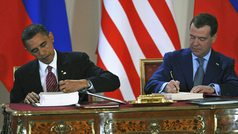International law for political scientists
Terminology matters a great deal to lawyers. Political scientists study international law, but we don't necessarily have the legal background to understand the significance of the terms. Below is my interpretation of a few terms that often come up in the literature and are covered in my Database of Human Rights. I've drawn chiefly from the Vienna Convention on the Law of Treaties and the UN Treaty Collection, and then translated into political science-ese. Warning: I am not a lawyer! My summaries below (like any summary) are simplifications. If they are incorrect, please contact me. Thanks.
Terminology matters a great deal to lawyers. Political scientists study international law, but we don't necessarily have the legal background to understand the significance of the terms. Below is my interpretation of a few terms that often come up in the literature and are covered in my Database of Human Rights. I've drawn chiefly from the Vienna Convention on the Law of Treaties and the UN Treaty Collection, and then translated into political science-ese. Warning: I am not a lawyer! My summaries below (like any summary) are simplifications. If they are incorrect, please contact me. Thanks.
* The database does not differentiate acceptance, approval, accession, or succession from ratification because they all carry the same international legal effect. Instead, the ratification variable is a catch-all indicating whether a state accepts a treaty as legally binding. |

